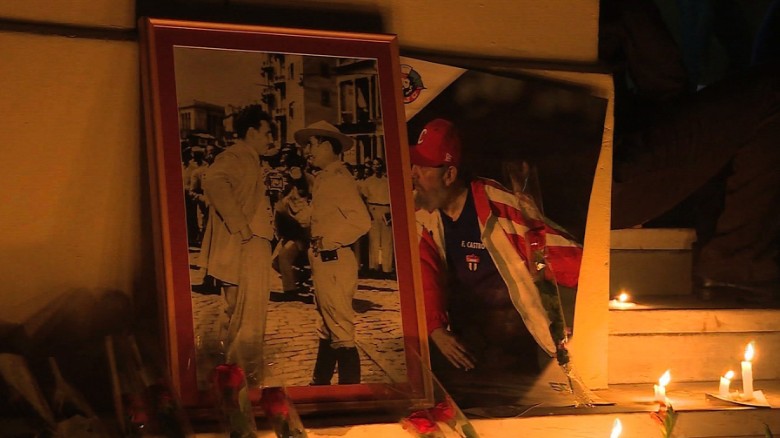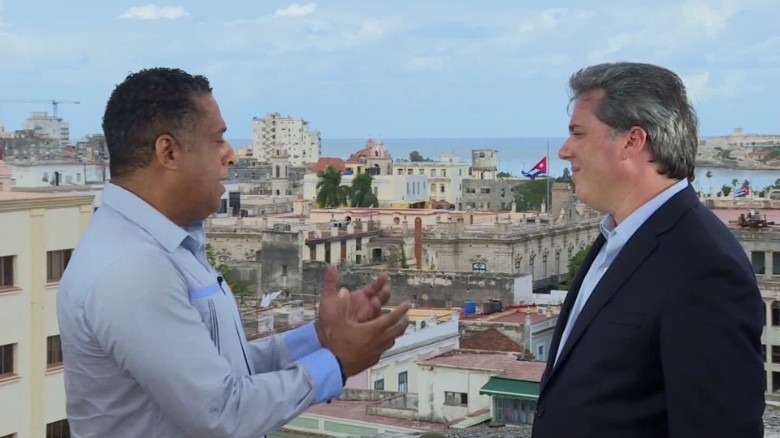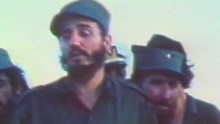Cubans, world commemorate Fidel Castro's life and death
Cubans will celebrate Fidel Castro's life at mass gatherings this week as the Caribbean country highlights the path Castro took during the revolution he embodied six decades ago.
The funeral for the longtime leader will be next Sunday, December 4, at Santa Ifigenia cemetery in Santiago de Cuba, the island's second largest city and site of the putative beginning of the Cuban Revolution in 1953.
The path of celebration
On Monday two simultaneous 21-gun salutes will fire in Havana and Santiago de Cuba to pay tribute to Castro, who ruled Cuba for nearly five decades, according to Cuba's state news agency.

In Cuba, days of mourning for Fidel Castro
On Tuesday evening in Havana, at least tens of thousands are expected to pay tribute to Castro in the large plaza named for national hero Jose Marti, a poet and leader of Cuba's 19th century fight for independence from Spain.
Read more
- Can Cuba move on?
- Castro, Mao: Communists that never saw eye to eye
- He survived 600 assassination attempts
- Trump marks passing of 'brutal dictator'
- Opinion: Socialism should die with Castro
- Mourning in Castro's hometown
- Crowds flood Little Havana in Miami
- His life in photos
- Castro's death brings joy and grief
- What now for US-Cuba relations?
- CNN Español's full coverage
On Wednesday Castro's ashes will begin a ceremonial journey east across the country, the reverse of the route Castro and his band of rebels took to seize power from dictator Fulgencio Batista in 1959.
His ashes are expected to arrive in Santiago de Cuba Saturday for a 7 p.m. rally at the Antonio Maceo Revolution Square.
On Tuesday through Saturday there will be cannon firings every hour on the hour from 6 a.m. to 6 p.m.
And on Sunday, Castro's ashes will be interred in the same cemetery where Marti is buried after a 7 a.m. service. At 9 a.m. that day, another 21-gun salute will fire simultaneously in Havana and Santiago de Cuba.
Sadness and joy
Castro died Friday at 90. His brother, Raul Castro, announced his death in a televised statement Saturday.
"I say to the people of Cuba, with profound pain I come here to inform our people, our friends of America and the world, that today, 25 November, 2016, at 10:29 pm, died the chief commander of the Cuban revolution, Fidel Castro Ruz," Raul Castro said.
A concert by famed tenor Placido Domingo was canceled and clubs usually alive with music went silent as public performances were stopped.
Cuban radio and television will broadcast patriotic and historical programming during the nine days of mourning that began Saturday, state news outlet Granma reported.
"The Cuban people are feeling sad because of the loss of our commander in chief Fidel Castro Ruz, and we wish him, wherever he is, that he is blessed, and us Cubans love him," a young Cuban woman told CNN.
At the University of Havana, where Castro attended law school 70 years ago, people placed flowers and photos by a statue on the campus' main steps.
In Bíran, a town near Cuba's eastern tip where Castro was born, people flocked to the home of his half-brother, Martin Castro. They wanted to know whether the hometown revolutionary was dead.
"They have been knocking and calling and asking if it is true," said Angel Daniel Castro, a nephew of Fidel Castro's.
"For us, he was like a father. And Cuba sees him as a father. One woman just called crying and saying she had lost her father. Everyone feels it."

Cuban-American: I was blacklisted in Cuba
In Florida, however, the mood was decidedly more festive. Revelers spilled into the streets of Miami's Little Havana neighborhood early Saturday. They popped champagne, clanged pots, cheered and waved the Cuban flag with signs reading, "Satan, Fidel is now yours."
"It means a lot for us Cubans," a reveler told CNN affiliate WSVN. "It's a moment that we've been waiting for 55 years....The man that caused so much suffering ... has passed away."
Johandys Comas, a 41-year-old Cuban in Miami who left his home country in 2004, described the mood as sober in his Cuban hometown of Cienfuegos.
"It's a party here, but back home my dad says it's quiet and everyone's mostly staying inside," Comas said. "You can't speak out in Cuba."
News Courtesy: www.cnn.com











